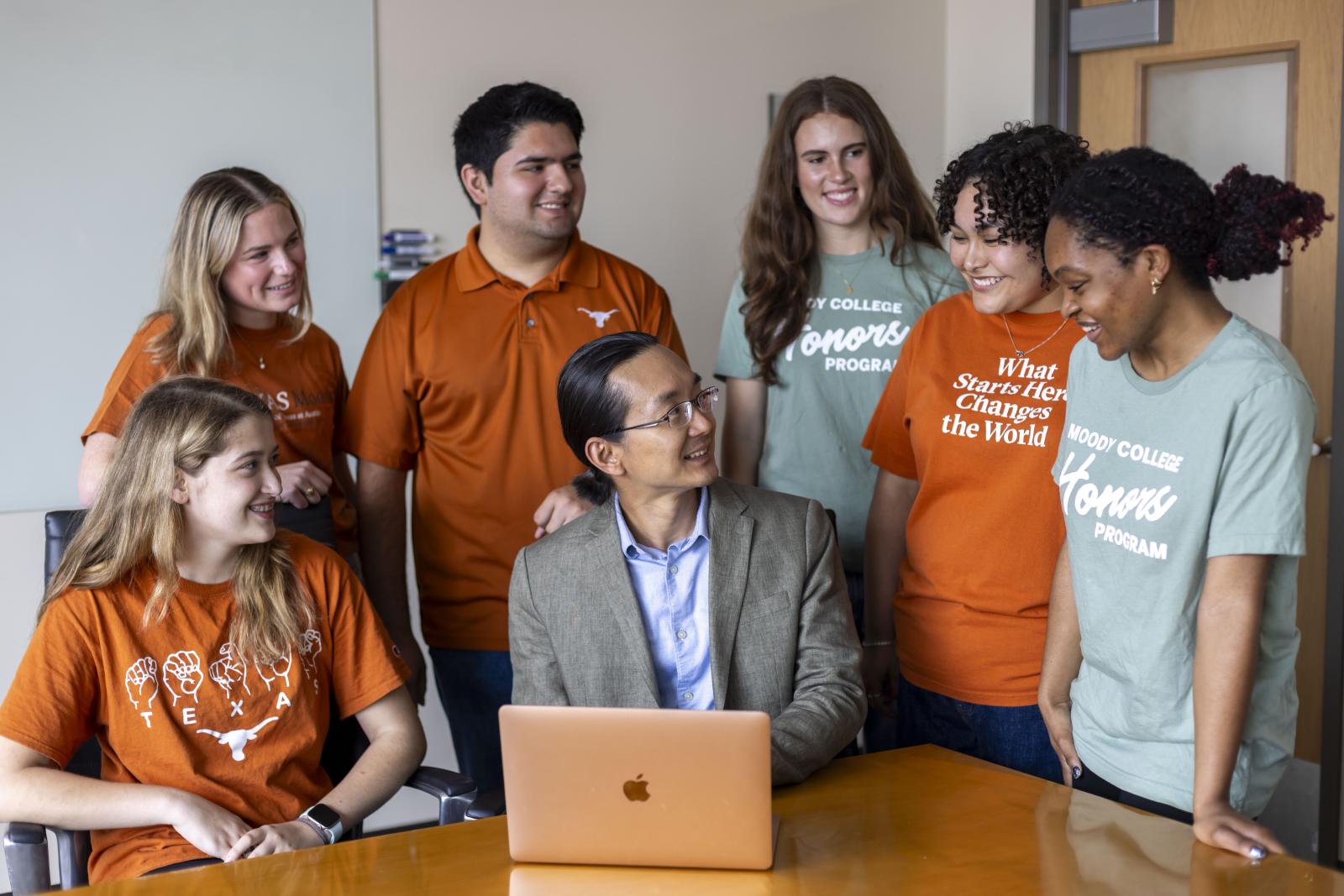Reframing the future of news

The Moody College of Communication Honors Program provides a unique opportunity for undergraduate students. The program makes a space for students to go beyond traditional learning and become pioneers in their respective fields, going deeper and exploring uncharted territory in their classes.
The program culminates in the capstone year, where seniors typically demonstrate their learning through a semester-long project or academic thesis.
Students can cover just about any theme or topic in their capstone projects. Previous students have produced autobiographical video essays, screenplay outlines and critiques on government programs. Guan Soon Khoo, the Moody College Honors Program director, believes the variety of projects and research reflects how interdisciplinary communication is as a field.
For some students, this freedom can be overwhelming. Senior journalism major Casey McKee, however, walked into the capstone class with her eyes already set on her topic.
McKee’s thesis, titled “Malice in the Machine,” explores how AI can be incorporated into defamation law and examines the question of where fault lies if newsrooms defame someone using information sourced from AI.
“My hope is to really speak to newsrooms who are wary about this technology and tell them, ‘I know that this is a scary thing toward your profession and that it’s being integrated in ways that we as traditional journalists might not agree with, but this is our future,” McKee said. “It’s inevitable that in some way AI is going to shape our future, so where do we go from here and how do we minimize the risk?”
This topic was inspired by McKee’s time in Media Law with Amy Sanders, a former associate professor in the School of Journalism and Media and McKee’s thesis advisor. Sanders also taught Social Media Law and Ethics in the Honors Program. These classes, like many law courses geared toward journalism students, touched heavily on the First Amendment and defamation in their curriculum.

Defamation is the act of making false claims that damage the reputation of its target. It has an extensive history in the field of law and is largely recognized as not protected under free speech.
McKee’s thesis delves into a new area of defamation law and questions AI’s stance under the First Amendment.
Speech created or contributed to by AI has a less defined status under the First Amendment compared to speech from other technologies. David Atkinson, a lecturer at UT Austin and AI legal counsel, reviewed McKee’s thesis and gave guidance about some of the nuances of this subject matter. He explained that while content created by software is considered protected speech because the developer is directly controlling the output based on the input, neither the developer nor the algorithm itself can predict what AI will produce.
“The common analogy is a garden,” Atkinson said. “You might provide a trellis and some water and soil, but you can’t control the way the vine is going to grow. The developers don’t know what the AI is going to say, therefore, it’s not really speech.”
As AI becomes increasingly sophisticated, more newsrooms are beginning to utilize it in their reporting, often for combing through lengthy or tedious documents and records. If journalists use an untrue piece of information from an AI source without vetting it, they could be held liable for defamation.
“There’s also concern for automation bias which is the idea that humans just defer to AI,” Atkinson said. “When you get output from machine learning or from AI, we tend to just accept it as truth. We think it's unbiased and objective, but really, all data is biased.”
In her thesis, which is structured like a law review instead of a traditional academic research paper, McKee argues that AI should be protected under the First Amendment as a facilitator rather than everyday speech — similarly to how a billboard can facilitate speech. For example, billboards are subjected to more government regulations because they are a means of speech, but not speech itself.
“I’m taking the beliefs of two different areas of expertise and merging them into one,” McKee said. “I’m saying that yes, these outputs should be protected in some way, but it shouldn’t be in the same way that a human receives First Amendment protections.”
McKee’s main goal is not necessarily to change the law, but instead to take a moral and ethical approach to helping newsrooms, with hopes to have her thesis published in a law review after presenting it at the honors symposium on April 21 and conducting an oral defense at the end of the semester.
“I’m advising newsrooms on how they can move forward in the face of this technology,” McKee said. “How can we use AI in a smart and informative way that doesn’t compromise journalistic integrity?”
Like many honor students, McKee’s thesis closely mirrors her future ambitions. She plans on attending law school at the University of Houston in fall 2025, studying intellectual property.
“My thesis is kind of bridging that gap between my undergraduate degree and my graduate degree,” McKee said. “It gave me room for exploration and to figure out what I wanted to do in law school, which then in itself made my law school application even more valuable.”
Beyond just graduating with a body of work that supports her goals, McKee believes that her time in the honors program was integral to her finding her place in college.
“I think it has been one of the most rewarding experiences at UT,” McKee said. “Not just for my work itself, but the body of scholars that I'm working with and the professors that I've met throughout the honors program. The students I've met have all been eager to hear my research and ideas. I feel like I am kind of working by myself, but in a collaborative space.”
